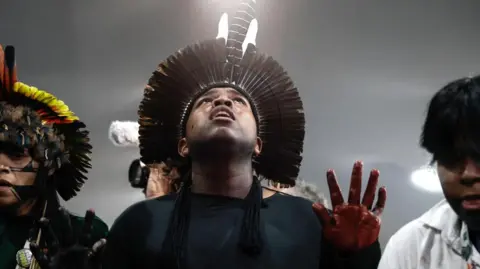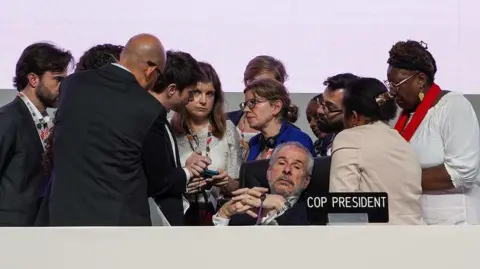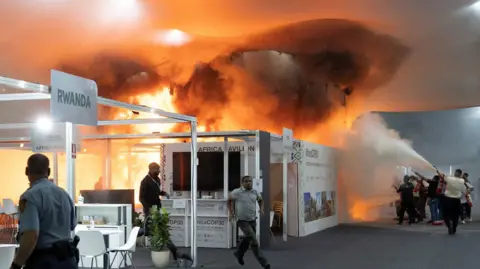Georgina RannardClimate and science correspondent, Belém, Brazil
 EPA
EPAFollowing bitter rows, the UN climate summit COP30 in Belém, Brazil has ended with a deal that contains no direct reference to the fossil fuels that are heating up the planet.
It is a frustrating end for more than 80 countries including the UK and EU that wanted the meeting to commit the world to stop using using oil, coal and gas at a faster pace.
But oil-producing nations held the line that they should be allowed to use their fossil fuel resources to grow their economies.
The meeting takes place as the UN says it fears global efforts to limit global temperature rise to 1.5C above pre-industrial levels have failed.
A representative for Colombia furiously criticised the COP presidency for not allowing countries to object to the deal in the final meeting on Saturday, known as a plenary.
Colombia’s President Gustavo Petro said he “does not accept” the agreement.
The final deal, called the Mutirão, calls on countries to “voluntarily” accelerate their climate action.
For the first time, the US did not send a delegation after President Donald Trump said the country will leave the landmark Paris treaty that committed countries to act on climate change in 2015. He has branded climate change “a con”.
Veteran negotiator and former Germany climate envoy Jennifer Morgan told the BBC that the US absence was a “hole” in the negotiations. Often the US has supported blocs like the EU and UK.
“In a 12-hour negotiation overnight, when you have oil-producing countries pushing back hard, to not have someone counteracting on that, it certainly was hard,” she said
But for many countries, the fact that the talks did not collapse or roll back on past climate agreements is a relief.
Antigua and Barbuda Climate Ambassador Ruleta Thomas commented: “We are happy that there is a process that continues to function […] where every country can be heard.”
In the final meeting, a representative for Saudi Arabia said: “Each state must be allowed to build its own path, based on its respective circumstances and economies.”
Like many other leading oil-producing nations, the country has argued it should be allowed to exploit its fossil fuel reserves as others have done in the past.
 UNFCCC
UNFCCCThe two weeks of talks were at times chaotic. Toilets ran out of water, torrential thunderstorms flooded the venue, and delegates struggled to cope in hot, humid rooms.
The COP’s nearly 50,000 registered delegates were evacuated twice. A group of about 150 protestors broke into the venue, breaching security lines, and carrying placards reading “our forests are not for sale”.
On Thursday a large fire broke out, rapidly burning a hole into the roof and forcing participants to evacuate for at least six hours.
Brazilian President Luiz Inácio Lula da Silva chose the city of Belém to put the world’s attention on the Amazon rainforest and to bring a rush of finance to the city.
Despite its desire for a more ambitious fossil fuel agreement, Brazil was criticised for its own plans to drill for oil at the mouth of the Amazon.
Its offshore oil and gas production is on course to increase until the early 2030s, according to analysis shared with the BBC by campaign group Global Witness.
 Reuters
ReutersCountries at the talks have competing interests, depending on their national circumstances and how exposed they are to the effects of climate change. Some countries were happy about the outcomes.
India praised the deal, calling it “meaningful”. A group representing the interests of 39 small island and low-lying coastal states on Saturday called it “imperfect” but still a step towards “progress”.
Poorer nations have come away with a promise for more climate finance to help them adapt to the impacts of climate change.
“It has moved the needle. There is a clearer recognition that those with historic responsibility [countries that emitted more planet-warming gases in the past] have specific duties on climate finance,” said Sierra Leone Minister of The Environment and Climate Change Jiwoh Abdulai.
 Reuters
ReutersBut it’s a sour end for more than 80 countries, who negotiated through the night to keep stronger fossil fuel language in the deal.
UK Secretary of State for Energy and Climate Change Ed Miliband insisted the meeting is a “step forward”.
“I would have preferred a more ambitious agreement,” he said.
“We’re not going to hide the fact that we would have preferred to have more, to have more ambition on everything,” EU climate commissioner Wopke Hoekstra told journalists.
With lush trees, bird cries and intense humidity, it was hard to escape the Amazonian backdrop of the talks.
Brazil launched the talks with a new fund called Tropical Forests Forever Facility that would pay countries to protect tropical forests. By the end of the meeting, it raised at least $6.5bn from governments, although the UK has not yet contributed.
Over 90 countries supported a call for a global deforestation action plan, or “roadmap”.





